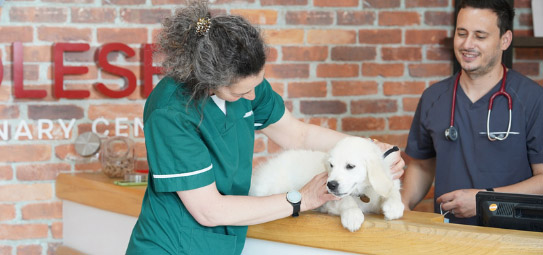
Vomiting in pets – what to do when it happens
May 25, 2023
If your pet seems under the weather, it is sometimes hard to know when to intervene. Seeing them vomit can be an unpleasant experience but how do you know when it’s an indication of something more serious?
As vomiting is a frequent occurrence in most cats and dogs, you can have peace of mind that the sickness should pass over a 24 hour period without the need of any veterinary intervention. Yet, it is also worth monitoring your pet as it could be an early symptom of something more sinister.
Our experienced team at Moseley Vets in Surrey have put together a helpful guide on this topic, highlighting the common reasons for vomiting, when you need to contact the vets and how to care for your pet when they are feeling sick.
Contact us if your pet is unwell
Everyday items can be dangerous
The first thing our experienced team of vets associates with vomiting are inquisitive puppies and kittens! These are the most common patients we treat for vomiting as their curiosity whilst exploring their surroundings often leads to them ingesting whatever they can find.
Our Head Vet Darren Partridge believes that the following common household and garden items are the most popular for puppies and kittens to ingest:
• Blankets
• String or ribbon
• Hairbands
• Underwear
• Items from the rubbish bin
• Toys
• Socks & shoes
• Sticks
It is worth ‘baby proofing’ your home as much as possible so your puppy/kitten doesn’t have free access to these items. As owners, you will be pleased to know that in most circumstances, these ‘foreign bodies’ will not cause lasting damage to your pet’s digestive system. However, sometimes it can cause obstruction or, depending on what has been consumed, toxicity.
Vomiting is often the first symptom of your pet’s stomach irritation as it’s their body trying to push out the unfamiliar substance.
The most common causes of vomiting
Regurgitation of food or hairballs is another common reason your pet may seem to be vomiting. It is worth noting that regurgitation is not true vomiting and is often a behavioural issue, most commonly seen in puppies. It often happens when puppies eat too quickly or kittens ingest too much of their hair when cleaning themselves. This is not usually serious but if the regurgitation episodes are becoming more frequent then contact us on 0208 979 1384 for further, tailored advice.
Vomiting, although often nothing to worry about, can also be a sign of a serious underlying condition. Kidney disease, pancreatitis and many more conditions are first diagnosed when we clinically examine pets for vomiting. Other reasons your pet may be vomiting also include:
- Gastroenteritis
- Food allergies
- Travel sickness
- Worms
- A change in diet
- A reaction to a medication
- An infectious disease
- Ingesting something poisonous
When to call the vets
Darren explains that for most one-off cases of vomiting, emergency veterinary treatment is not required, and the symptoms will pass in a few hours. Yet, if left untreated, this can turn into a veterinary emergency. If your pet exhibits any of the following, you should treat it as an emergency and contact us immediately:
- Vomiting often and frequently, for example, more than once in 24 hours
- Unproductive vomiting – where nothing comes up or frequent retching
- Your pet is vomiting and is very young or very old and therefore more vulnerable
- Your pet has other serious diagnosed conditions such as diabetes or kidney disease
- Your pet has a bloated and/or tender tummy
- The vomit is a red/brown colour or contains specks of red, indicating blood
- Your female dog is vomiting and is pregnant and/or has vaginal discharge
- The vomiting is accompanied by diarrhoea
- Your pet is wobbly or unsteady on its feet
- Your pet collapses or seizures
Please also note that if you believe your pet has ingested a toxic substance, you must contact us immediately. Do not wait for them to vomit – prompt treatment gives your pet the best chance at recovering. Call us immediately on 0208 979 1384.
More information on emergency cases
Caring for a sick pet
If your pet feels nauseous you may spot the following signs:
- Salivating or dribbling
- Licking lips
- Shying away from food
- A hunched posture
- Restlessness and pacing around (dogs)
- Sitting still with eyes closed or half closed (cats)
- Being ‘clingy’ and not wanting to leave your side
- Hiding away
- Eating grass (dogs)
Here are some tips on how to best care for your pet if you notice any of these signs:
- Ensure they have calm, safe, quiet surroundings so they can rest
- Keep warm and comfortable
- Offer them small amounts of fresh drinking water but do not force them to eat or drink
- Do not walk or exercise them for 24 hours except to go to the toilet
- If vomiting has stopped and they seem brighter it is safe to offer them a small amount of bland food such as plain boiled chicken, however it is best to call us first for feeding advice
If you are concerned about your pet and they are feeling nauseous or vomiting, please call the Moseley Vets team on 0208 979 1384 and we will advise you on the best course of action.



